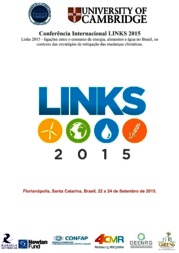Embrapa Agrobiologia
 Busca de publicações
Busca de publicações
Fossil to renewable transition for sustaining food, water and energy.
Autoria: LIMA, I. B. T. de; BULLER, L. S.; SCHWERT, F.; GOULART, T.; ULSENHEIMER, R.; SILVA, G. B. S. da; NOGUEIRA, S. F.; MESA-PEREZ, J. M.; SORIANO, E.
Resumo: Human appropriation of land and evapotranspiration for crop-livestock and dams to sustain people in cities are major drivers affecting the provision of global ecosystem services as climate, water, carbon, nitrogen, and phosphorus regulations. Human carbon emissions from fossil burning and land use worsen both the depletion of planetary services and global warming. The recognition that problems arise essentially from fossil-driven land use enlighten realistic solutions. In particular, finite fossil resources must be redirected to forge new renewable-based economies. The objective of this article is to show that healthy feedback loops of renewable markets are economically viable and a sine qua non condition for improving the resilience of natural and anthropic ecosystems to cope with forthcoming challenges of climate change. Urban and rural areas of a Brazilian municipality, São Gabriel do Oeste, are used as an illustrative case study to reducing carbon and water footprints through fossil resources reallocation to technological and social innovations in distributed renewable energy (biogas-to-power), storm water recovery, wastewater treatment (biodigester), waste recover and recycling (organic fertilizers and soil conditioners), and recovery of basic ecosystem services.
Ano de publicação: 2015
Tipo de publicação: Artigo em anais e proceedings
Unidade: Embrapa Territorial

